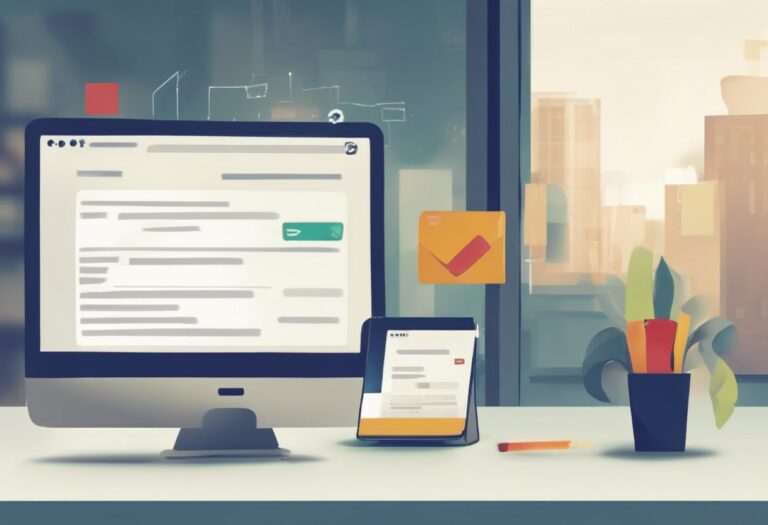10 Professional Ways to Say “You Forgot the Attachment”

Sometimes, people forget to attach files to their emails, which can slow down work.
This article offers ten different ways to remind someone to send an attachment without sounding rude. Each suggestion is tailored to be polite, professional, and suitable for various workplace scenarios.
Is It Professional to Say “You Forgot the Attachment”?
The phrase “you forgot the attachment” can be considered professional, formal, or informal, and polite, depending on the context and tone in which it’s used. This phrase is straightforward and clearly communicates the issue, making it useful in many work-related situations.
It works well among colleagues who have a good understanding of each other, as well as in more relaxed corporate environments. Nonetheless, it might be a bit too direct when communicating with a client or senior management for the first time, where a more detailed and polite tone is expected.
Here’s an example:
Hi Mark,
I'm writing to follow up on our earlier conversation. Could you kindly send over the document you mentioned? It seems you forgot the attachment.
Thanks,
Emily
Let’s consider the pros and cons of using this phrase:
Pros:
- It’s direct and to the point, leaving no room for misunderstanding.
- It saves time, especially in fast-paced work environments.
- It’s easily understood by people from various professional backgrounds.
Cons:
- It might be perceived as too blunt or informal in certain contexts or cultures.
- It lacks a sense of politeness or formality, which might be necessary in some professional interactions.
- It may not convey an appropriate level of concern or offer assistance in resolving the oversight.
While “you forgot the attachment” is a clear and straightforward way to address missing attachments, someone might want to use an alternative phrase to soften the message or to ensure the tone is appropriate for the recipient.
10 Other Ways to Say “You Forgot the Attachment”
Here are ten common professional alternatives to the phrase “You Forgot the Attachment” that are suitable for use in a professional email within a workplace environment:
- It seems the attachment didn’t come through.
- Could you please check if the document was attached?
- I believe the attachment is missing.
- Looks like the attachment was left out.
- I think you might have missed attaching the document.
- The document appears not to have been attached.
- Would you mind resending with the attachment?
- It looks like the file wasn’t attached.
- Seems we’re missing the attachment on this one.
- Please remember to attach the document.
1. It seems the attachment didn’t come through.
This phrase is more informal than the original, yet remains professional and polite. It softly suggests that an error occurred without directly blaming the recipient. This alternative is especially useful in scenarios where you wish to maintain a light and friendly tone. It’s great for emails between colleagues or when communicating issues to clients in a non-accusatory manner.
We recommend using this alternative in email communications where the relationship allows for a bit of informality without sacrificing professionalism. It’s not suited for messages where strict formality is required.
Example:
Hi Alex,
I've just checked your last email, and it seems the attachment didn't come through. Could you send it again?
Best,
Sam
2. Could you please check if the document was attached?
This alternative is polite and formal, employing a courteous request for action. It implies that there might have been an oversight without directly stating it. This choice is perfect for communications that require a level of formality, or when addressing someone you’re not very familiar with.
We recommend this for emails to clients or senior management where preserving a professional demeanor is of utmost importance. It fits well in a variety of contexts, from formal to moderately informal, depending on the tone of the rest of the message.
Example:
Hello Dr. Greene,
Thank you for your email. Could you please check if the document was attached? I couldn’t find it in your previous message.
Kind regards,
Natalie
3. I believe the attachment is missing.
This phrase hints at an oversight in a formal yet polite manner. It’s direct but does so without any underlying accusations. This makes it a strong candidate for professional emails where clarity is key, yet a soft approach is preferred.
Suitable for use in communications with both colleagues and external contacts, this alternative fits especially well in settings where you wish to be explicit about the missing attachment while keeping the message cordial.
Example:
Dear Jordan,
I believe the attachment is missing from your last email. Would you mind resending it?
Thanks,
Casey
4. Looks like the attachment was left out.
This alternative is slightly informal but remains professional and polite. It suggests an oversight has occurred in a non-confrontational way. This phrasing is ideal for internal communications where the relationship is more casual.
This is particularly effective in emails to colleagues or in environments where the corporate culture supports a friendly tone. Not recommended for first-time communications with new clients, where a more formal tone is necessary.
Example:
Hey Jamie,
Just giving you a heads-up, looks like the attachment was left out of your email. Can you send it over?
Cheers,
Dylan
5. I think you might have missed attaching the document.
This sentence is professional, formal, and polite. It gives the recipient the benefit of the doubt and is softer than directly stating the attachment is missing. It’s great for when you want to be respectful and give a gentle reminder.
Use this in more formal email exchanges where a degree of respectfulness is paramount, such as with clients, senior management, or external partners. It maintains professional decorum while addressing the oversight.
Example:
Dear Ms. Thompson,
In reviewing your recent email, I think you might have missed attaching the document. Could you kindly check?
Warm regards,
Oliver
6. The document appears not to have been attached.
This phrasing is both formal and polite, making it suitable for professional settings. It indicates the missing attachment in a factual manner without placing blame. This is particularly useful when you need to maintain a high level of professionalism.
This alternative is recommended for emails to higher-ups or clients where you need to address the issue without any direct accusations. It’s equally suitable for formal and semi-formal interactions, providing a balanced approach to pointing out the oversight.
Example:
Hello Mr. Patel,
Upon reviewing your email, I noticed that the document appears not to have been attached. Could you please send it again?
Best wishes,
Elena
7. Would you mind resending with the attachment?
This request is polite and informal, making it ideal for conversations with colleagues or within teams where there’s an existing rapport. It’s straightforward and directly addresses the need without implying fault.
Perfect for internal communications or informal emails where brevity is appreciated, and the tone can be more relaxed. It’s not the best choice for very formal communications but works well in most professional scenarios.
Example:
Hi Keith,
Would you mind resending with the attachment? I think it didn’t come through the first time.
Thanks,
Morgan
8. It looks like the file wasn’t attached.
This alternative is informal yet professional and polite. It subtly brings attention to the missing file in a non-accusatory way. This phrasing is great for fostering a friendly atmosphere even when addressing oversights.
Suitable for emails between colleagues or when you have an informal relationship with the client. It balances professionalism with a light-hearted tone, which can help maintain a positive relationship despite the minor mistake.
Example:
Good morning Lisa,
It looks like the file wasn’t attached to your last email. Would you be able to send it again?
Thank you,
Tony
9. Seems we’re missing the attachment on this one.
This phrase is informal and friendly, with a tone that’s professional enough for workplace correspondence. It’s particularly effective in minimizing any potential embarrassment over the oversight. This alternative is most appropriate for internal communications.
Recommended for use in a relaxed corporate culture where messages can be conveyed casually. It’s better suited for communicating with colleagues or within teams rather than with clients or senior management, where a more formal tone is preferred.
Example:
Hey Aaron,
Seems we’re missing the attachment on this one. Could you send it over when you get a chance?
Thanks,
Sophia
10. Please remember to attach the document.
This variant is direct but remains polite and is on the cusp of formal and informal. It serves as a reminder rather than a pointed observation, making it a gentle nudge for action. This phrasing can be used in both internal and external communications, provided the relationship allows for straightforward requests.
This is a good choice for when there’s a need to remind someone without sounding too stern. It’s effective in professional settings where directness is valued, and the communication lines are open and friendly.
Example:
Hello Veronica,
I'm looking forward to reviewing your report. Please remember to attach the document to your email.
Best regards,
Jordan
Final Thoughts
Choosing the right way to tell someone they forgot an attachment can help keep your work communication smooth and friendly. The ten alternatives provided allow for flexibility, depending on whom you’re emailing and the situation. By using these polite and professional phrases, you can avoid misunderstandings and keep your emails clear and effective.






